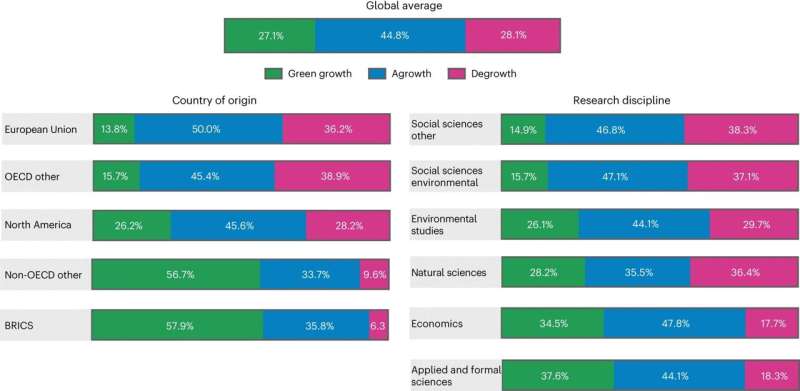This article has been reviewed according to Science X's editorial process and policies. Editors have highlighted the following attributes while ensuring the content's credibility:
fact-checked
peer-reviewed publication
trusted source
proofread
Green growth loses favor with climate policy scientists

Despite strong promotion of the green growth perspective by a variety of policymakers and international institutions, a new article led by the Institute of Environmental Science and Technology of the Universitat Autònoma de Barcelona (ICTA-UAB) reveals widespread skepticism among climate policy researchers in high-income countries.
The concept of green growth has become almost ubiquitous in recent years among policymakers and international institutions, including the World Bank, the European Union, and the OECD. Nonetheless, a growing body of research within the scientific community is challenging the idea that green growth is fundamentally possible or even desirable, while pointing to other alternatives.
The article, published in Nature Sustainability and carried out by ICTA-UAB together with ESCP Business School (France), the Graduate School of Economics and Management of the Ural Federal University (Russia), and the University of Málaga (Spain), shows that a growing body of researchers emphasize the need to prioritize sustainability, social justice, and human well-being, even if this means a reduction in material consumption and economic activity.
The new economic paradigm called post-growth argues that the pursuit of infinite economic growth is incompatible with planetary boundaries. In other words, alternative economic frameworks are needed to achieve long-term sustainability and well-being.
Post-growth scholarship has evolved and diversified in a variety of perspectives that can fall into two main categories: degrowth and agrowth.
From the survey, 73% of the 764 researchers surveyed prefer options such as agrowth or degrowth to green growth policies, although the degree of skepticism varies significantly depending on the country and research discipline of the respondents.
A total of 86.1% of the researchers from the European Union for instance expressed very high levels of skepticism about green growth, while North American researchers were less likely to hold degrowth positions compared to those from other OECD countries.
In contrast, more than half of the researchers from non-OECD countries, most importantly BRICS (Brazil, Russia, India, China and South Africa), expressed views aligned with a green growth position.
Social scientists, excluding economists, were the most skeptical of green growth, while on the other hand environmental and other economists expressed views aligned with green growth.
Support for post-growth theories increases as income and welfare levels rise among respondents. The researchers argue that beyond a certain point, prioritizing GDP is misguided as the social and environmental costs of pursuing further growth may exceed the benefits.
"We also found that climate policy researchers with a degrowth position tend to support direct regulation (standards, quotas, bans) while green growth proponents support innovation subsidies. It is worth studying if countries have systemic differences in their policy implementation depending on their income level," adds one of the co-authors, Professor Ivan Savin.
"The paper shows that green growth skepticism is more prevalent among researchers in high-income countries than might be expected from their extensive institutional and political support," concludes Lewis King, ICTA-UAB researcher and co-author of the study.
Definition of degrowth and agrowth
Within the broader post-growth framework, degrowth stands as a pronounced stance, critiquing capitalism and advocating for a deliberate and equitable reduction in material consumption and economic activity in high-income countries to achieve more sustainable and socially just societies. Agrowth instead represents the idea of growth agnosticism. The central point is that progress should not be judged solely through GDP due to its inadequacy in reflecting societal well-being.
Instead, policymakers should be neutral about economic growth as it could yield both positive and negative outcomes for the environment or social goals. In this sense, agrowth can be interpreted as a middle-ground position situated between the green growth and degrowth paradigms. Both agrowth and degrowth can be considered as shades of green growth skepticism, falling within the overarching post-growth framework.
More information: Lewis C. King et al, Shades of green growth scepticism among climate policy researchers, Nature Sustainability (2023). DOI: 10.1038/s41893-023-01198-2. www.nature.com/articles/s41893-023-01198-2
Journal information: Nature Sustainability
Provided by Autonomous University of Barcelona




















